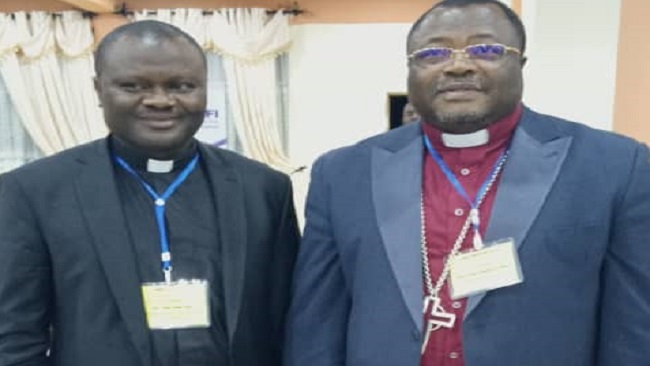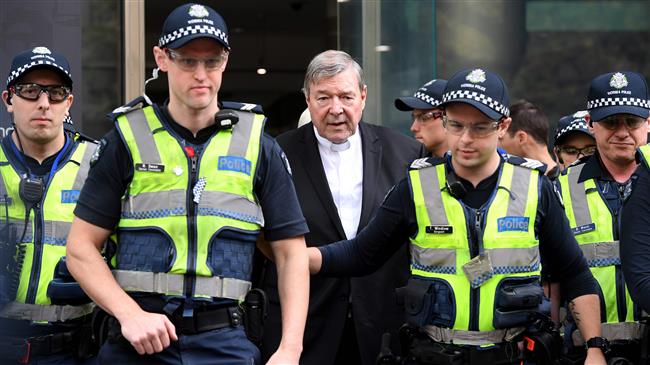21, November 2019
Uncovering Moderator Fonki Samuel’s sin and Corruption in the Presbyterian Church in Cameroon 0
The leadership of the Presbyterian Church in Cameroon (PCC) was engineered to be rooted in the stability of a relationship with God and the simplicity of a life that is straightforward and open. This rootedness in a God-centered life of righteousness enables Moderators of the PCC to face the confusion and conflicts that arise as a result of morally wrong motives, relationships and actions and are peacemakers.
This has not been the case with the PCC ever since the man they call Reverend Fonki Samuel Forba took over command. Recently in Buea and under the direct supervision of the French Cameroun governor of the South West Region, the Right Reverend Samuel Fonki was re-elected as Moderator of the Presbyterian Church in Cameroon for the next five years.
The well fed Fonki Samuel was elected on Monday at the end of the 50 Synod. His acolyte Reverend Hans Abia of the Presbyterian Church Bonamoussadi was also elected Synod clerk in a counterfeit electoral process never known in the history of the PCC.
The two so-called men of God were given the five year mandate unopposed after their challengers were all forced to step down by French Cameroun security agents. The CPDM style of voting still had to go on and the Rt. Rev. Samuel Fonki was declared winner with 119 votes.
After the elections, a concerned child of God painted the PCC on social media using the following words “The Presbyterian Church in Cameroon has become a political church (house) where pastors do campaign for a post to govern rather than to ask God for wisdom to lead his Christians. Shared monies and under looked other pastors rather than praying and communion with each of theirs, suspend others and hate them rather than LOVING and protecting them.”
The devil was given free reign in Buea on that fateful day to do as much damage as possible to the PCC’s unfolding divine purposes. The devil actually found an effective place to press his diabolical schemes deep within the Presbyterian Church in Cameroon. It is in Rev Fonki Samuel- the human entrusted with shepherding the flock that makes up the Presbyterian Church in Cameroon and by extrapolation, the body of Christ in the world.
Listening to the Moderator after church service in Mulheim an der Ruhr in Germany some months ago, Rev Fonki came across to me like a Bamileke car dealer whose mission to Europe was to acquire second hand cars and ferry them to Cameroon. His life is extremely lacking in integrity and generosity. On the micro level, he is full of tribal arrogance, self gratification and indifference towards the needs of other Christians and the PCC family. My 18 year old son whispered into my ears during his Homily in Mulheim that this is not a man willing to take a stand on a matter of moral principle within God’s family. To be sure, Fonki only knows two things: profit and promotion.
It is no secret that the Christian doctrine of original sin has fallen out of favour with Rev Fonki and his gang in the Presbyterian Church in Cameroon and violating moral law to gratify lust, greed, or hunger for power is now the order of the day.
Either way, words seem inadequate for the egregious committing or covering up of crimes by Rev Fonki Samuel and his so-called pastors but Jesus’s own warning about vicious wolves in sheep’s clothing that seek to devour God’s flock should be well-taken.
Fonki and his demons in cassock have their councilors, lieutenant, mayors who do not serve and preach Christ, but are busy counting their cars and houses including hotels and naming them one by one. The Moderator-elect is under public scrutiny for embezzlement, financial malpractice and lust for married women.
After his Buea victory, Moderator Fonki held a CPDM style celebration party where he danced with members of his PCC consortium of crime syndicates and lavished church money on those who attended the show.
Beyond the heart-wrenching suffering experienced by Christians of the Presbyterian Church in Cameroon and those who love the PCC, and for all who suffer the direct consequences of Fonki’s sin, there is only one answer, one hope for humanity: Jesus Christ.
The Jesus Christ as painted by a small group of Pastors using these immortal words “Dear brothers and sisters good evening. We want to heartily thank all who supported us spiritually, financially and physically. We came out of the race when we could not win in the first or second position in the Synod Committee. People showed more loyalty to the one who appointed them PS or HOD rather than to Jesus Christ who called them to the ministry of Word and Sacraments. We came out with our heads high as we did not engage in any mafia deals, bribery and corruption or mysticism. It was a Synod of Unity and Peace that produced an EXCO of Disunity and Enemity. Pray for the PCC and for its hierarchy to repent and be Christ-Centred. Revds Mokoko and Nganji.”
To this I put my name
Soter Tarh Agbaw-Ebai

























22, November 2019
Roman Catholic prelates lead ‘peace caravans’ to Southern Cameroons 0
Catholic prelates are leading two “peace caravans” to inform the people of Cameroon’s two English-speaking regions of the resolutions of the Oct. 29-Nov. 4 “Major National Dialogue” aimed at ending a secessionist rebellion in the country.
Cameroon’s English-speaking North West and South West regions have been experiencing a civil conflict since 2016, when demonstrations broke out after there were demands to use French – the majority language in Cameroon – in their common law courts and English-modeled schools.
English speakers make up around 20 percent of the country’s population and have long complained about being marginalized by the French-speaking ruling class.
After Cameroon’s security forces’ heavy-handed response – including using live ammunition on demonstrators – rebel movements arose calling for the independence of Anglophone Cameroon, saying the new country would be called Ambazonia.
The conflict has left at least 3,000 people dead and over 500,000 displaced.
Cardinal Christian Tumi, the emeritus Archbishop of Douala, has been leading the caravan to the North West region, and Bishop Andrew Nkea of Mamfe has been heading the caravan to the South West region.
The two prelates have been outspoken in their condemnation of the abuses by both sides in the conflict and have both also been strong advocates for the rights of the Anglophone community in Cameroon. Their participation should lend credibility to the national dialogue, which was boycotted by the rebel groups.
In separate meetings to kick-start their tour, the cardinal and the bishop both made it clear that violence can never be a solution to any problem.
“It’s a campaign to promote peace between us; you cannot have peace without love,” Tumi said.
“Peace is the key word. Without peace, there is nothing,” the cardinal added, before describing the pains inflicted by separatists on some citizens.
“I know of a young man whose hands were chopped off. He is now handicapped for life,” he said.
“It’s our children, our brothers and sisters who are fighting, cutting the hands off those who are going to school,” Tumi said, and called on separatists not to be fighting “their brothers and sisters.”
Drawing parallels with the peace efforts made after World War II, the cardinal said that “violence will never lead us anywhere; World War II ended up in dialogue, and the United Nations was founded precisely to make sure it never happens again.”
The cardinal also denounced attacks on local plantation workers that have crippled the economy of the two Anglophone regions, and condemned the fact that separatists made a school boycott a corner stone of their fighting strategy.
He said the approach of the “peace caravan” was aimed at changing hearts and minds.
“To these our children who are hiding in the bushes and in the forests, the way of talking to them matters,” Tumi said.
“We should talk to them with understanding, talk to them with gentleness. Why not invite them to your table and offer them a cup of coffee and then you talk with them,” the cardinal explained.
In the country’s South West region, Nkea expressed his concerns that the conflict had led to the dehumanization of the local population, the destruction of local businesses, the crippling of the education sector, and the significant loss of human life.
As part of efforts to ensure that the peace caravans gain legitimacy, the Mamfe bishop said local leaders who had failed the people should not be part of the caravans and went as far as to call on them to resign.
Nkea noted that most elected officials in the Anglophone regions – members of parliament, senators and mayors – have fled the area since the fighting began, which the bishop called a dereliction of duty.
“This caravan is people-oriented … If people elect you to represent them and you are disconnected from them, then you don’t have any reason to be representing them,” the prelate said.
Nkea said the peace caravans have a duty to explain the resolutions of the Major National Dialogue to the people and warned against making unkeepable promises that could raise expectations too high.
“We should be realistic. We should not invent. We are going, not to please the people, but to explain,” he said.
Explaining the “special status”
As part of efforts to resolve the Anglophone problem, Cameroon’s government has proposed a special status for the two English-speaking regions. The arrangement would give more autonomy and protect their identity as a people.
“The issue of special status must be well explained. As we go around talking, this special status has to be made for everyone to understand what it is,” Nkea said.
The peace caravans have their work cut out for them. Separatist rebels have been targeting clergy, accusing them of collaboration with the government for participating in the peace process.
One priest was murdered by rebels on Nov. 1 in a kidnapping for a ransom gone wrong.
Crux